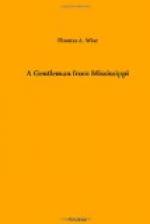At the close of his formal speech he began on his statement of the action of the naval affairs committee in buying control of the Altacoola land to foil attempts to rob the Government. As he had predicted, the Senate did “sit up.” The Senate did agree that a new kind of politics had arrived.
During this latter part of the speech many curious glances were directed at Peabody and Stevens, who sat in the same tier of seats, in the middle of the chamber, only an aisle separating them. Through this choice of seats they could confer without leaving their places. Various senatorial associates of these two men in other deals found it difficult to believe their ears—but was not old Langdon at this moment narrating the amazing transaction on the floor of the Senate? Would the statue on the pedestal step down? Would the sphinx of the desert speak the story of the lost centuries? Would honor take the place of expediency in the affairs of state? What might not happen, thought the Senate machine, now that Peabody and Stevens had taken to their bosoms what they termed the purple pup of political purity?
Neither did the full portent of the situation escape the attention of the reporters’ gallery. Dick Cullen observed to Hansel of the Record:
“Virtue’s getting so thick around here it’s a menace to navigation.”
“Blocking the traffic, eh?” queried Hansel; and both laughed.
“Hello! What’s this?” exclaimed Cullen a few minutes later. “Horton has been recognized, when the program was to adjourn when the naval base bill was over with.”
Langdon’s speech had proved the hit, the sensation of the session. After he concluded, amid resounding applause, in which Senators joined, as well as occupants of the galleries, Senator Horton of Montana rose and caught the presiding officer’s eye.
“I ask unanimous consent to offer a resolution.”
Hearing no objection, he continued, in a manner that instantly attracted unusual attention:
“It is my unpleasant duty”—Peabody and Stevens exchanged glances—“to place a matter before this body that to me, as a member of this honorable body, is not only distasteful, but deeply to be regretted.
“There has arisen ground to suspect a member of this body with having endeavored to make money at the Government’s expense out of land which he is alleged to have desired his own committee to choose as the naval base.
“I therefore offer this resolution providing for the appointment of an investigating committee to look into these charges.”
Langdon was intensely excited over this new development. “Some one has learned something about Peabody or Stevens,” he muttered. He feared that this new complication might in some way affect the fate of the naval base—that the South, and Mississippi, might lose it. He rose slowly in his seat, while the Senate hummed with the murmur of suppressed voices.




